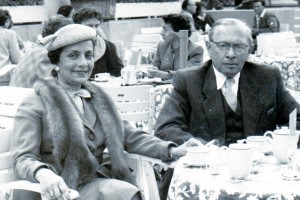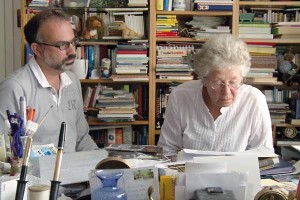“German Jews are interesting,” remarks the Israeli director Arnon Goldfinger dryly in his award-winning documentary film Ha-Dira (הדירה 2011).
Clearing out the apartment of his recently deceased Jewish-German grandmother Gerda in Tel Aviv is the point of departure of Goldfinger’s investigative journey through time. Until then, his grandmother’s German past was kept secret from her family. One can imagine therefore how perplexed the many relatives were when they stumbled upon some editions in the apartment of the Nazi propaganda newspaper Der Angriff (The Attack) from 1935.
Gerda Tuchler and her husband Kurt, who had emigrated together in 1937 to Tel Aviv, kept copies of the newspaper on account of a series of articles entitled “A Nazi travels to Palestine,” in which they themselves were named.
It was they, in 1934, who accompanied Eichmann’s predecessor, Leopold von Mildenstein, on his journey for the “SS Department for Jewish Affairs.” Von Mildenstein spent the trip searching for a solution to the so-called Jewish question, while the Zionist Tuchler made the case for an independent state in Palestine. From under layers of dust, old photos and letters emerge, documenting a close friendship between von Mildenstein, his wife, and the Tuchlers – a friendship that continued after the war. It is an unsettling discovery considering the fact that Gerda’s mother, who had refused to emigrate, was deported and murdered at the concentration camp in Riga.
With the results of his research, Goldfinger confronts his own mother again and again over her resistance to learning about her mother’s involvement in this history. The outcome of this confrontation is a remarkable closeness between mother and son, which increases as the mother – the real key figure in the film – opens up to a past kept long enough in the dark. It is not an appetite for embarrassing family secrets that distinguishes Ha-Dira, but rather the subtly directed encounters between generations in the face of a past that touches them all. Goldfinger treats his grandmother’s apartment as one would a museum: he draws from everything there that might otherwise have landed in the garbage heap or in an antique shop to spin a tale, full of unexpected twists and rich in German-Jewish history.
Denis Grünemeier, Collections
The film unleashed much controversy at the Jewish Museum Berlin, as the following excerpts from an e-mail correspondence show.
So, Ha-Dira begins promisingly. There are differences between the daughter and her son about their emotional access to the legacy left by the parents (and grandparents, respectively). They are presented here as a family controversy, but remain interesting for only as long as the director is treating the subject around and in the apartment.
Even the discovery of the documents about a joint trip to Palestine that the grandparents took with NSDAP comrade and SS member Leopold von Mildenstein and his wife – talked up in reviews as a German-Jewish family secret – provided real excitement, as long as it remained unclear what it was really about. But at the latest when historian Avraham Barkai enlightens the filmmaking grandson about the Ha’avara arrangement between the German Reich, the British Mandate, and leaders of the Jewish settlements in Palestine, the contemporaneous historical background of the secret is explained. For me, at this point, the story is over. Everything that comes after these twenty minutes was full of insincere pathos, disingenuous emotional display, banal and dull.
Cilly Kugelmann
We agree in our appraisals of the film Ha-Dira. I was in fact miserably bored after twenty minutes. And I see it as you do: the exposition of the subject gave me hope; the scene with the antiques dealer, who wants to dispose of the useless old books, is the only point where one suspects the entirety of the history – that a whole world has been destroyed. But the filmmaker didn’t rise to the occasion of these topics that fate dropped in his lap – with his silly naïveté and the reproachful attitude towards his mother just under the surface, she having apparently not talked with him enough and not been interested enough in it all herself.
The poor mother seems to have been punished with a dim-witted son, who even insists on taking her to a serial house to sip champagne with some Nazi descendants or other. In the end, one learns that the middle-aged Israeli filmmaker is evidently psychologially and intellectually unable to deal with the “Holocaust.” The film greatly provoked me, probably because I go to the cinema so seldom and, when I do go, I don’t want to watch such junk.
Ha-Dira, directed by Arnon Goldfinger, 2011, is currently playing in movie theatres in Germany.



